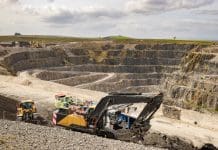Greenock Ocean Terminal’s crane infrastructure is set to be upgraded, with £25m invested in two cranes to secure the port for the future
Greenock Ocean Terminal has removed and replaced crane rails in preparation for new cranes to be constructed.
The Greenock cranes represent an upgrade worth £25m in future-proofing the port’s operations.
The Greenock cranes will be ship-to-shore
Greenock port sees around a third of all the containers that enter the country, making it a vital port for trade in Scotland. Cranes are furthermore vital for infrastructure.
Deans Civil Engineering is working with Peel Ports on the Greenock cranes upgrade project; Deans had previously provided a team of 30 onsite engineers, foremen, groundworkers, and project, site, and contract managers.
Peel Ports notes that this is the largest investment the port will receive in over 50 years.
Peel Ports and Deans Civil Engineering commented on the cranes:
James McSporran, director of Clydeport at Peel Ports Group, said: “The arrival of our new cranes later this year represents a really important milestone in the history of Clydeport. They will be key in future proofing the port, as well as helping us meet increased demand from cargo owners and fostering continued economic and employment opportunities in the Inverclyde area.”
Managing director Steven Deans, of Deans Civil Engineering, said: “We have been working on Peel Ports projects for several years now, initially as a civils and groundwork subcontractor to others.
“On this project we adopted the role of principal contractor which has allowed us to effectively manage complex subcontract packages, such as marine and rail subcontractors, while self-delivering the civils element of the project. These included Rapid Rail for the installation of new crane rails, Shearwater Marine to fit the four storm anchors on the vertical face of the quayside and RJ Smith for earthing works. As Deans is predominately a civils and groundworks contractor, our wider team’s expertise was crucial to the project due to the complex nature of the works.”
“The priority for Peel Ports was that Deans would be a self-sufficient unit and that we could deliver the project in phases on time for the delivery of the new cranes.”















